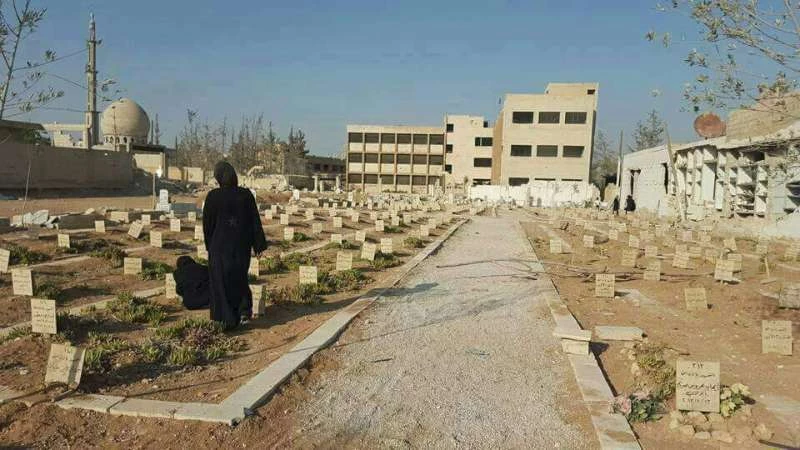Though being half destroyed, the 4-meter room that lacks electricity and running water overlooks the graveyard in which her husband along with her three sons, Ammar, Omar and Ahmad, were buried.
Om Ammar, 46, known by “Mother of the Martyrs” is the only survivor of her seven-member family.
Her eldest son, Ammar, was 23 years old when he was shot dead by a regime’s sniper during the first peaceful demonstrations that took place in Darayya in April 2011.
Om Ammar still remembers when Ammar and his friends insisted on taking to the streets on that Friday holding up roses and olive branches.
On that day, Ammar put extra bottles of water and some dates in his handbag and told his mother then that he would give them to the regime’s soldiers whom he believed to be forced to carry out their masters’ unfair orders.
On that gruesome evening, Ammar didn’t come back home. He was shot in the head along with other six demonstrators.
With the death of the first protestors, the fledgling uprising became bigger and wider in the town. More well-educated young men with an unflinching determination were goaded into joining in the rapidly growing protest in challenge to the repressive Assad regime’s attempts to crackdown on their daily activities.
Assad’s bloodthirsty militias couldn’t tolerate the peaceful demonstrators who were singing and clamoring for freedom and justice. They raided the town repeatedly and arrested many activists.
Om Ammar still remembers the day when the body of Ghiath Matar, an activist who became well-known for giving flowers and roses to army soldiers, was delivered to his family after three days of arrest.
Ghiath was killed with cold blood under torture. His throat was cut off and handed separately to his mother as a threatening sign that says: "Keep silent or you will die like your son.”
The intimidating tactics followed by Assad regime’s secret intelligence didn’t deter Om Ammar’s second son Omar, 21, a computer specialist, from joining the widening circles of protest in Darayya.
Omar soon became a member of a local media office that documents Assad’s daily atrocities. His own camera was his mighty weapon, but for Assad regime it was even more dangerous than any machine gun.
In August 2012, Assad forces and pro-regime’s Shabiha militia raided some streets in Darayya killing more than 400 people.
Omar was killed and his camera was destroyed. His body was found near the main square in Darayya. Assad Shabiha took off his eyes and set his body on fire.
Om Ammar says that Omar was greatly inspired by Mahatma Gandhi pacifist way of resistance. He kept a photo of Gandhi in his room and as the background photo on his computer.
Omar always refused violence as a way of resistance, but a week before his death his mother heard him talking with his friend Bassam while they were making comparisons between Assad brutal regime and the British colonial authorities.
Having lost her two sons, Om Ammar urged her three married daughters to leave the town. Ahmad insisted on staying with his parents.
Later in 2014, Om Ammar’s husband was killed after a barrel bomb fell on his small shop in the main market in the town leaving the widowed and bereaved mother alone with her last remaining son.
Ahmad who was just 16 when the uprising broke out couldn’t hide his ire. He joined the FSA in 2015 after his frustration with the pacifist way of resistance came to a boil.
At that time the weary town which was once famous for its fruit trees and fertile soil that used to provide neighboring towns and cities with different kinds of vegetables was almost wiped out after thousands of barrel bombs turned it into a ghost city.
The Assad regime tightened the noose around Darayya and practiced its scorched-earth policy, people were put in the dilemma of “starve or kneel.”
Ahmad along with his mother had to move from their destroyed house to a safer place. They found a small half-destroyed apartment near the town’s graveyard. Ahmad wanted to find an exit for his diabetic mother but it was nearly impossible to find a safe passage particularly after Assad regime imposed a full siege on the rebellious town.
In March 2016, Ahmad was escorting a half-lorry that carried some food supplies to his completely cordoned off town when a sniper’s bullet put an end to his long-sought dream of seeing Darayya and Syria completely liberated. Om Ammar said that when Ahamd was killed, he had been without any food for two days.
After her three sons and her husband were killed, Om Ammar had nobody left for her in Darayya other than their graves. She kept watering the flowers that she had planted on their tops and reciting prayers.
Yesterday, Om Ammar was told by the local council in Darayya that a deal has been reached with Assad regime to evacuate the city. She had to leave with the other remaining civilians and fighters.
Once she got the news, Om Ammar went to the four graves and started to weep and asked them to forgive the remaining fighters in Darayya who were obliged to give up their town. She was speaking as if her beloved four bodies were really listening.
She asked herself whether it was the end of the story of Darayya which courageously and valiantly fought for five years a brutal regime, but soon she recalled what her son, Omar, used to say in that oppressors might win a round but they can never prevail.



التعليقات (0)